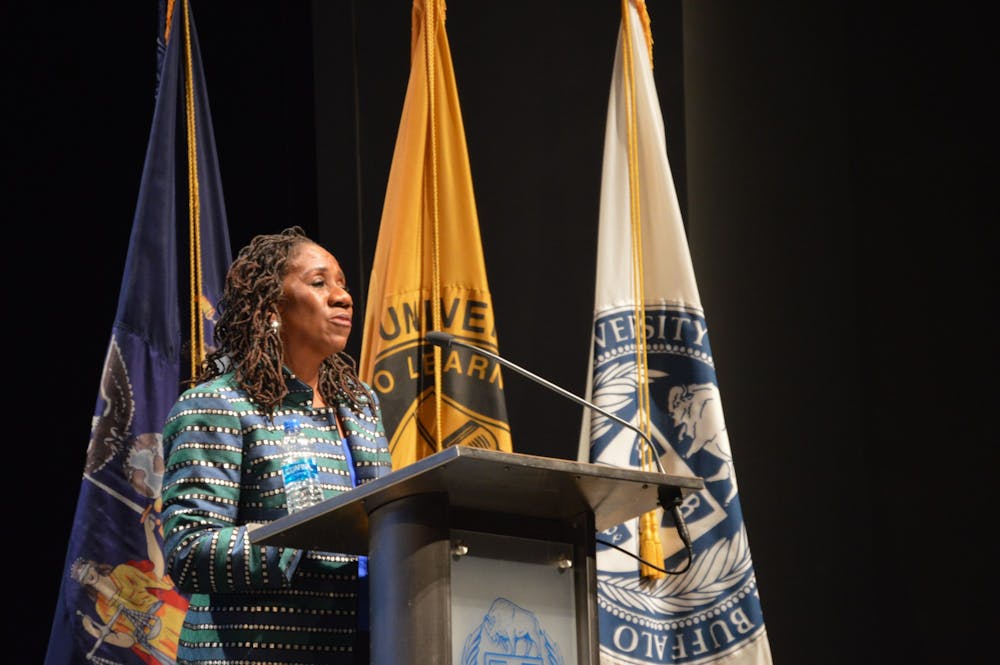Sherrilyn Ifill, the former president and direct-counsel of the NAACP Legal Defense and Educational Fund spoke at UB last Thursday as the 47th annual Dr. Martin Luther King Jr. Commemoration keynote speaker.
Calling herself a “student” of King, Ifill focused her speech on “the depth of this extraordinary man and leader as a way of inspiring us to what we can be.”
While reflecting on some of King’s advocacy throughout the Civil Rights Movement, and his memorable speeches, Ifill challenged the audience to direct their attention to a specific sentence of King’s “I Have a Dream” speech that she believes has been misused.
The “overused” sentence — “I have a dream that my four little children will one day live in a nation where they will not be judged by the color of their skin but by the content of their character” — has, in Ifill’s opinion, been distorted “to suggest that Dr. King and his advocacy was focused on creating a colorblind world in which you pretended not to notice race.”
Ifill believes the meaning behind this sentence is not solely focused on King’s children but our character as a nation, which is constantly being tested.
Ifill asked the audience to think about these key questions throughout her interview with Aviva Abramovsky, the dean of UB’s school of law, “Who are we? What is the content of our character?”
The conversation shifted to Ifill’s legacy and her contributions to the decades-long fight to achieve racial equity.
Ifill first addressed affirmative action, providing an overview of the never-ending battle over affirmative action at the Supreme Court, a subject that Ifill has written about extensively. Challenges to affirmative action have “largely been brought by white students,” she said. But recent challenges are different, with Asian American students mostly leading the charge.
“I would never deny the opportunity to challenge some act by a state actor that they believe is discriminatory,” Ifill said. “But, that is the beauty of litigation. Litigation puts you through your paces, and you have to prove it.”
Ifill urged the audience to not “be caught in the undertone of what people say about race-conscious admissions.”
She stated that a Supreme Court decision overturning affirmative action would be “radical” and would have to “simply ignore” decades of precedent.
“The rule of law is absolutely critical to any healthy democracy,” Ifill stated. “There is no healthy democracy that does not adhere to the rule of law. The rule of law means that laws, enacted and legislative, must apply equally to the rich to the poor or to the Black and to the White.”
She described lawyers as having a “noble profession,” and turned the conversation to the power of lawyers’ responsibilities beyond the courtroom. The release of wrongfully convicted individuals, for example, is an “abomination” rather than a cause for celebration because of all the years already lost in prison.
“We [attorneys] just keep it moving,” Ifill said. “So for me, that is unacceptable for lawyers because we are in this profession. We purport to the actors in this justice system. We get our professional status from it. We get our jobs from it. We can see that the system has that level of injustice. Of course, no system is going to be perfect. But, if you’re not directly speaking to that, it is deeply problematic to me.”
Ifill encouraged those interested in law to go to law school and “behave as though you are charged with upholding the rule of law.”
Ifill’s words reminded Audrey Joseph, a junior English and political science major, why she is interested in studying law.
“You don’t really get to hear that every day,” Joseph said. “I know some people who just want to go to law school to make money, but this really reminded me why I wanted to go to law school and the power law school could have to help people, especially people in underrepresented communities where the law is not on their side.”
Ifill concluded her speech by circling back to the questions she asked the audience to keep in mind during her speech: “Who are we? What is the content of our character?”
You don’t need to be a practicing attorney or know the endgame to fight for what’s right, Ifill said. She urged the audience to vote, show up at board meetings, support public infrastructure, and contribute as a member of society to work towards an equitable democracy.
“We’re not absolved, because it all looks so terrible and poor,” Ifill said. “It has not been all bad, as I said, because we benefited from the sacrifices before us and now don’t have to pay it forward. It’s difficult, but that’s because a democracy constantly has to be worked on. It’s not like you have a democracy and then that’s it. You have to keep working and making sure you don’t backslide.”
Ariel Clarke, a senior criminology and political science major, felt moved by Ifill’s optimism.
“You don’t always have to know what the end goal is or you don’t always have to know what your job is to do the work, you could just do it because you care,” Clarke said. “At the end of the day, you’re making an impact, even if you don’t know what that impact is.”
Read The Spectrum’s interview with Sherrilyn Ifill here.
Kiana Hodge is a news editor and can be reached at kiana.hodge@ubspectrum.com





